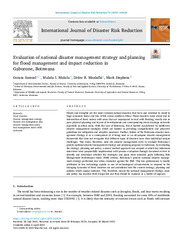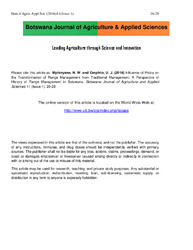| dc.contributor.author | Samuel, Gorata | |
| dc.contributor.author | Mulalu, Mulalu I. | |
| dc.contributor.author | Moalafhi, Ditiro B. | |
| dc.contributor.author | Stephens, Mark | |
| dc.date.accessioned | 2022-09-23T09:26:03Z | |
| dc.date.available | 2022-09-23T09:26:03Z | |
| dc.date.issued | 2022-05 | |
| dc.identifier.citation | Samuel, G., Mulalu, M. I., Moalafhi, D. B., & Stephens, M. (2022). Evaluation of national disaster management strategy and planning for flood management and impact reduction in Gaborone, Botswana. International Journal of Disaster Risk Reduction, 74, 102939. | en_US |
| dc.identifier.issn | 22124209 | |
| dc.identifier.uri | 10.1016/j.ijdrr.2022.102939 | |
| dc.identifier.uri | https://hdl.handle.net/13049/535 | |
| dc.description | Article was published under CC BY-NC-ND 4.0 licence. | en_US |
| dc.description.abstract | Floods and droughts are the most common natural disasters that have and continue to result in huge economic losses and loss of life across southern Africa. Flood disasters come about due to intersection of flood waters with areas that are unprepared to deal with flooding, mostly due to poor physical planning and layout of developments and corresponding storm drainage networks especially in urban areas. With the case of Botswana, this is further exacerbated by ineffective disaster management strategies which are limited in providing comprehensive and proactive guidelines for mitigation and adaptive measures. Further, failure of the Botswana disaster management strategy is as a consequence of it being used as an all-purpose disaster management framework that does not recognize that different types of disasters have their individual unique challenges. This study, therefore, used the disaster management cycle to evaluate Botswana's generic national disaster management strategy and planning program in Gaborone. In evaluating the strategy, planning and policy, a mixed method approach was adopted at which key informant interviews were purposefully implemented with process evaluation through document review to identify and determine whether the strategies and plans meet intended goals following Risk Management Performance Index (RMI) criteria. Botswana's generic national disaster management strategy performed low when evaluated against the RMI. This low performance is mostly attributed to low technology uptake as use of technological advancements to respond to the changing dynamics of flood disasters are not assimilated into the current strategy, planning and policies which appear outdated. This, therefore, means the national management strategy, plan, and policy has reached their design life and thus should be replaced as a matter of urgency. | en_US |
| dc.language.iso | en | en_US |
| dc.publisher | Elsevier | en_US |
| dc.relation.ispartofseries | International Journal of Disaster Risk Reduction;74, 102939 | |
| dc.subject | Disaster management policy | en_US |
| dc.subject | Disaster management strategy | en_US |
| dc.subject | Disaster risk management plan | en_US |
| dc.subject | Flood disasters | en_US |
| dc.subject | Gaborone | en_US |
| dc.subject | Risk management index (RMI) | en_US |
| dc.title | Evaluation of national disaster management strategy and planning for flood management and impact reduction in Gaborone, Botswana | en_US |
| dc.type | Article | en_US |


